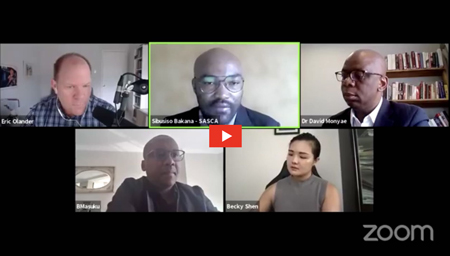COVID-19 Cooperation from two Super Powers - China and USA: Lessons for Africa
By Sibusiso R Bakana, Ph.D. Candidate in Beihang University, President of SASCA, and Representative of The Diplomatic Society in China
It is almost two years now since the outbreak of the coronavirus, Covid-19, when the first cases were reported, and since then the number of people infected with the virus has grown all over the world. As these two superpowers were seen to muddle in a blame game and intensified conspiracy theories directed at each other, more was and still can be done to support developing communities. Politics aside, let scientific evidence be the driver for robust win-win cooperation for a desired shared future in the global community.
By observing what has been happening in the new normal global theatre, South African Students in China Association (SASCA) together with the University of Johannesburg – Centre for Africa China Studies (UJ-CACS) collaborated for a webinar themed “COVID 19 Cooperation from two Super Powers - China & USA: What can Africa learn?”. Mr. Eric Olander, a former journalist from BBC, CNN amongst others gave an account of what has transpired thus far with regards to Covid-19 in the world in the context of the USA and his observation was that there was a lack of commitment from the two superpowers in helping developing countries. He points to the negligence of the USA and its delay in acting terms it “missing in action”.
Ms Becky Shen who holds a masters degree in countering organized crime and terrorism from the University College of London and co-founder of Eternal Rise Asia Pacific LTD, stressed that scientific explanations are needed for the virus to mitigate the previous blame game of the virus. She spoke about the role of China in assisting developing countries. As Dr. Yazini April previously wrote on vaccine diplomacy, it seems from Ms. Shen that China positioned itself properly, while Mr. Olander suggests that both superpowers have to work harder to strengthen cooperation in the world.
Idowu & Ogunnubi recently published the predominance of South African soft power and demonstrated it by the art diplomacy from Master KG Jerusalema's song and dance. During this pandemic, the South African government was allowed not to window dress by congratulatory messages but to start taking art and culture diplomacy seriously in positioning her people. I am pointing to this because the new normal brought about by the coronavirus also affects people psychologically with lots of disruptions observed and the South African soft power was seen contributing to easing that.
Dr. David Monyae a director from UJ-CACS asserted during the webinar that the South African soft power is neglected. He questioned the vaccine value chain which Africa is not benefiting from it and he also questioned the lack of building Africa’s capacity through manufacturing its own vaccines, not only for coronavirus but even for other viruses and future ones. He stressed that when the two superpowers sneeze, Africa always catches the flu. Participants raised concerns with regards to vaccine passports and were concerned about students who wish to go back to China, while the response was not clear on that, but we can conclude that vaccine passports are political and not yet countries policies.
The keynote speaker was Dr Bandile Masuku, who is a member of the Gauteng Provincial Legislature and a professional Obstetrician & Gynaecologist, who led the initial Covid-19 Pandemic Response in the province. He admitted that the coronavirus has exposed the deep inequalities and scarce resources in Africa, particularly in Education and Health, as they are a priority for a prosperous nation. As the virus continues to manifest in different variants, he cautions us all that we will live with it in the coming future and that Africa should emulate the Chinese socialism, as he asserts that the coronavirus in China is managed and it has cooperation with the world. According to Dr Masuku, the USA is seen as a loser when observing its responses regarding Covid-19 cooperation with the developing world and it is only acting now after it secured more vaccines than its population.
As a health professional, Dr. Masuku did not shy away from the indigenous knowledge that can be used in preventing current and future viruses and emphasized the importance of formalizing African Traditional Medicine and pointed out that South Africa can also use its BRICS membership role in partnering with China as seen from China how they managed to mitigate coronavirus in using both western and traditional Chinese medicines. He advised that Africa in promoting its Traditional Medicine should not be viewed as fighting for western medicines but complementing each other, as that will be the best illustration of “African Solutions for African Problems”.
As the two superpowers position their vaccine diplomacy, more scientific evidence is needed to avoid positioning the virus as a political weapon for the developing world. While on the other hand, South African art and culture soft power ascend, African Traditional Medicine can be well-positioned in starting now to manufacture our vaccine as the virus mutates in different variants for us to be active participants in vaccine diplomacy.


